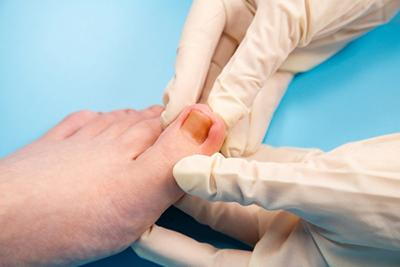Treating Your Ingrown Toenails
posted: Jan. 29, 2024.

An ingrown toenail refers to a common foot ailment in which the edge of one of your toenails grows into the nearby skin, which can cause various and often painful symptoms. According to Dr. Joseph DiFranco of DiFranco Family Foot Care in Erie, PA, an ingrown toenail - a.k.a. onychocryptosis, most often affects the big toe but can happen to one or more toes on either foot.
Ingrown Toenail Symptoms
In addition to the fact that an ingrown toenail may be visible to the naked eye, other symptoms of this condition commonly include the following –
- Redness, tenderness, and swelling.
- Pain and discomfort in the affected area.
- If the ingrown toenail becomes infected, the related symptoms of swelling, pain, and discharge may become more intense or pronounced.
In severe circumstances, the skin around the ingrown toenail may become hardened and overgrown.
Ingrown Toenail Causes
An ingrown toenail can occur for a number of reasons. In addition to having a genetic predisposition, or anatomical factors that may increase your risk, these are the other reasons they may cause the formation or development of ingrown toenails –
- Poor Nail Trimming Habits – Toenails should be trimmed carefully – and in a straight-across manner (and not too short!) to prevent ingrown toenail issues from manifesting. The corners of the nail may be rounded by a nail file, but they should not be rounded with clippers. Additionally, practicing appropriate foot hygiene (e.g., keeping your feet dry and clean) can help avoid an infection created by an ingrown toenail.
- Footwear That Is Too Tight, Etc. - Choosing shoes that are ill-fitting, i.e., without enough room in the toe box, for example, can exert pressure in a way that causes an ingrown toenail to develop.
- Trauma to the Affected Toe(s) – Stubbing a toe or any other similar injury can cause an ingrown toenail to become an issue.
Podiatric Treatment Options for Ingrown Toenails
When the ingrown toenail is a mild case, simply soaking your foot in Epsom salts and warm water often helps to manage the condition and related symptoms – as does keeping the area clean and dry. However, if an ingrown toenail does not heal and is left untreated, this situation has the potential to develop into a more severe condition - like a skin infection (a.k.a. cellulitis) or an abscess. If an infection is present, Dr. DiFranco may prescribe a course of antibiotics or a topical antibiotic.
In some cases, surgical intervention may be needed to provide desired relief.
Seeking Medical Care from a Leading Erie, PA, Podiatrist
If you experience pain, discomfort, or swelling, or if an ingrown toenail doesn't begin to heal with conservative home measures, contact Dr. DiFranco or a member of the DiFranco Family Foot Care's staff at 814-217-0618 or online.
